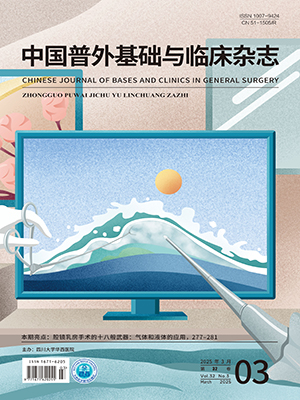Objective To investigate whether the growth of the human experimental hepatocellular carcinoma (HCC) can be suppressed by the antibody against vascular endothelial growth factor (VEGF). MethodsThe monoclonal antiVEGF antibody was injected to nude mice nearby the xenograft tumour foculs of the human SMMC7721 HCC. The changes of the tumour size were measured at different times. The intratumoural microvessels were showed by immunohistochemical staining of CD31 antigen; the apoptotic cells in the tumour tissues were detected in situ by terminal deoxynucleotidyl transferasemediated dUTPbiotin nick end labeling (TUNEL) assay. ResultsIn the first and second week after finishing the injection procedure, the tumour sizes were compared as the length (mm) multiplying width (mm) between the two groups, the tumour sizes as the test group vs the control group were (26.46±19.81) mm2 vs (105.77±17.40) mm2 (P<0.001) and (45.20±23.02) mm2 vs (150.77±77.41) mm2 (P<0.05), respectively. After 2 weeks the intratumoural microvessel density (iMVD) and the apoptotic index (AI) were compared between two groups with iMVD being (2 311±120)/mm2 vs (3 900±328)/mm2(P<0.001 ) and AI being (15.31% vs 6.83%), P<0.005. Conclusion The antiVEGF antibody can suppress the xenograft tumour growth of the human SMMC7721 HCC by antiangiogenesis.In fact, its antitumour effect is produced by elevating the incidence of apoptosis in tumour tissues.
Citation: XIE Naichang,LI Guowei,WANG Zhiliang,et al.. The Growth Inhibition Effect of Antibody Against Vascular Endothelial Growth Factor on Experimental Hepatocellular Carcinoma in vivo. CHINESE JOURNAL OF BASES AND CLINICS IN GENERAL SURGERY, 2002, 9(4): 242-245. doi: Copy
Copyright © the editorial department of CHINESE JOURNAL OF BASES AND CLINICS IN GENERAL SURGERY of West China Medical Publisher. All rights reserved




